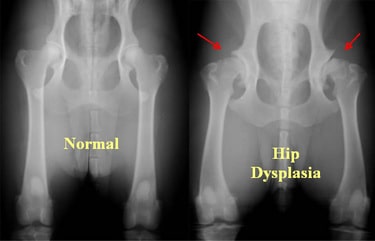Hip dysplasia in dogs: When Bello has hip problems (HD).
Hip dysplasia in dogs can cause serious problems for man's best friend. This common hip joint disorder affects both young and older dogs and can cause pain and reduced mobility. But don't worry, there is hope! In this article, we will provide you with all the important information about canine hip dysplasia (HD) so that you know how to help your beloved four-legged friend.

Hip dysplasia in dogs: what's behind it?
Causes of hip dysplasia (h2) Hip dysplasia in dogs is a hereditary disease characterized by maldevelopment of the hip joint. The main causes of this disease are:
- Genetic predisposition: Some dog breeds are more susceptible to hip dysplasia, such as Golden Retrievers, German Shepherds and Labrador Retrievers.
- Diet: An unbalanced diet can increase the risk of hip dysplasia in dogs, especially if they grow too quickly.
- Physical activity: Too much or too little exercise can affect the development of the hip joints, increasing the likelihood of hip dysplasia.
- Injuries: An injury to the hip joint, especially in young dogs, can lead to maldevelopment of the joint.
Signs and symptoms HD
A dog with hip dysplasia may show some of the following symptoms:
- Limping or lameness, especially after physical activity
- Difficulty standing up, lying down or jumping
- Limited mobility and stiffness in the hind legs
- Pain or discomfort in the hip region
- Clicking or grinding noises when moving the hip
Diagnosis and examination HD
To diagnose hip dysplasia in dogs, your veterinarian will perform a thorough examination and may take x-rays. These images can show whether the dog's hip joint has any misalignments or other signs of hip dysplasia.
Treatment options (h2) Treatment of hip dysplasia in dogs depends on the severity of the disease and the age of the dog. Some of the most common treatment options are:
- Conservative Therapy: In many cases, hip dysplasia in dogs can be controlled with conservative measures such as painkillers, anti-inflammatory medications, physical therapy, and weight management. A balanced diet and regular, moderate exercise can also help improve the condition.
- Surgical interventions: In more severe cases or when conservative treatment approaches are not sufficient, surgery may be necessary. There are several surgical options to treat hip dysplasia, such as triple pelvic osteotomy (TPO) or total hip arthroplasty (THP) . Your veterinarian will recommend the best option for your dog.
FAQs: Frequently asked questions about HD
Can hip dysplasia in dogs be cured?
There is no actual cure for hip dysplasia as it is a hereditary disease. However, in many cases the symptoms can be successfully controlled and the dog's well-being improved.
How can I prevent hip dysplasia in dogs?
A healthy diet, regular exercise, and appropriate weight are crucial to minimizing the risk of hip dysplasia in dogs. When choosing a dog, you should also pay attention to genetics and whether the parents have been screened for hip dysplasia.
Are certain dog breeds more affected by hip dysplasia?
Yes, some dog breeds such as German Shepherds, Golden Retrievers and Labrador Retrievers are more prone to hip dysplasia. However, the disease can also occur in other breeds and mixed breeds.
How long does recovery take after surgery?
The recovery time after surgery to treat hip dysplasia varies depending on the type of procedure and the individual dog. In general, it can take several weeks to months for the dog to regain full mobility.
Conclusion: Get hip dysplasia in dogs under control
Hip dysplasia in dogs is a serious condition that can have a significant impact on your four-legged friend's life. However, with timely diagnosis and appropriate treatment, you can help your dog live a pain-free and happy life. Pay attention to symptoms, talk to your veterinarian, and implement recommended therapies to help Bello with hip problems.

Pingback: Dog diseases of popular breeds - Karlsruhe Veterinarian - Arndt Small Animal Center